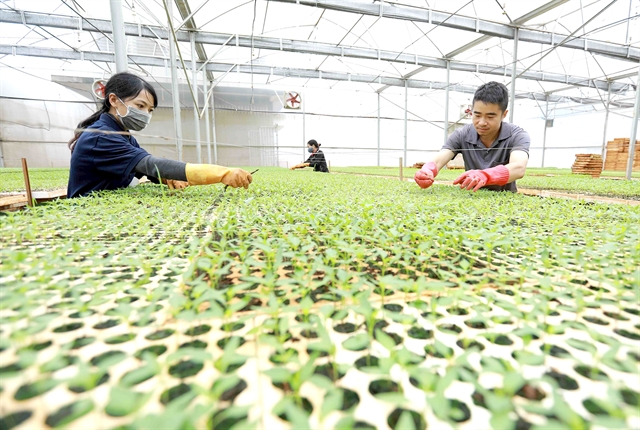
HÀ NỘI — To achieve ambitions to become a modern-oriented industrialised nation by 2030 and a developed country with high income by 2045, Việt Nam must succeed in the digital transformation process, in which agriculture is one of the priority areas, Minister of Foreign Affairs Bùi Thanh Sơn said.
Minister Sơn gave the statement at the Vietnam Agricultural Digital Transformation International Forum 2021, themed “Keeping up with market trends, ensuring the pivotal role of the economy during and after the COVID-19 pandemic.” which was held virtually on Thursday by the Ministry of Foreign Affairs (MOFA), the Vietnam Digital Agriculture Association (VIDA), and e-newspaper VnExpress.
The forum is a place for dialogue and public-private policy activities between the Government, private sector and stakeholders. It was also an activity within the framework of the Vietnam International Agricultural Exhibition 2021 (AgriTech Expo 2021).
Sơn said the Vietnamese Government attaches great importance to accelerating digital transformation, considering it a breakthrough and an opportunity to boost socio-economic development. Minister Sơn said the COVID-19 pandemic poses major challenges to Việt Nam’s agriculture and it’s important to promote digital transformation in agricultural development.
"To prepare for Việt Nam’s economic growth post-pandemic, MOFA will work closely with relevant ministries, sectors, localities and businesses and expand international cooperation. We aim to boost digital transformation in agriculture," said Minister Sơn.
Minister of Agriculture and Rural Development Lê Minh Hoan said over the years, the agriculture sector has been instrumental in supporting economic growth during difficult times.
At present, the agriculture sector makes up 14 per cent of the country’s GDP and employs 40 per cent of the total workforce. He said the labour productivity and output in the sector have reached their limits in terms of technology, affected by depleted natural resources and negative impacts from climate change.
Hoan said it was essential for the sector to change the mindset from agricultural production to the agricultural economy.
Hoan pledged to offer all resources and the most favourable policies for businesses wishing to bring added value to Vietnamese agricultural products and improve their trademarks.
The Ministry of Agriculture and Rural Development (MARD) would strongly support the digital transformation process and replace agricultural technology models because the Vietnamese agricultural sector is not only the “backbone” of the economy in difficult times, but was also a measurement of sustainability of the country, he said.
Trương Gia Bình, president of the Vietnam Digital Agriculture Association told participants that a strong push for digitalisation is needed, especially in e-commerce, e-payment, logistics, and production that could turn Việt Nam into a global power in agriculture production.
Bình added favourable weather conditions in Việt Nam mean farmers could work all year round, even in winter, not to mention two-thirds of the population live in rural areas.
Delivering a speech at the forum, Deputy Minister of Information and Communications Nguyễn Huy Dũng said Việt Nam, given its starting point as an agricultural country, had banked on the sector to grow both in the past and at present.
During the pandemic, the role of the sector was increasingly important to ensure society’s survival, said Dũng.
Lack of resources, digital infrastructure, and financial preparation were key barriers to the digitalisation process in Vietnamese agriculture, he said.
"Furthermore, farmers play an important role in agricultural digital transformation, but it is not easy for them to approach and adapt to new technologies. So, more training and support are needed to equip farmers with the necessary digital tools."
Commenting on this problem, Kohei Sakata, head of Digital Farming Solution Incubator of Asia-Pacific region at Bayer Corporation, said there were many digital farming solutions on the market but they were not designed for smallholder farming. Most of these solutions focused on commercial farming with large acres and high affordability. When it came to the pain points of the smallholder farmer segment in Việt Nam, the biggest challenge was that the value chain was broken and farmers could not capture the value they created due to this value chain inefficiency.
The forum consisted of two discussions that focus on policy orientations and the theme “Shaping Việt Nam’s digital agriculture until 2035” with presentations by 20 speakers representing local authorities and leaders of businesses and corporations.
Participants at the event also shared scenarios of Việt Nam’s agricultural digital transformation by 2035, key issues in Việt Nam’s agricultural development strategies towards digitalisation given complicated impacts of the COVID-19 pandemic, supply chain disruption and climate change. — VNS